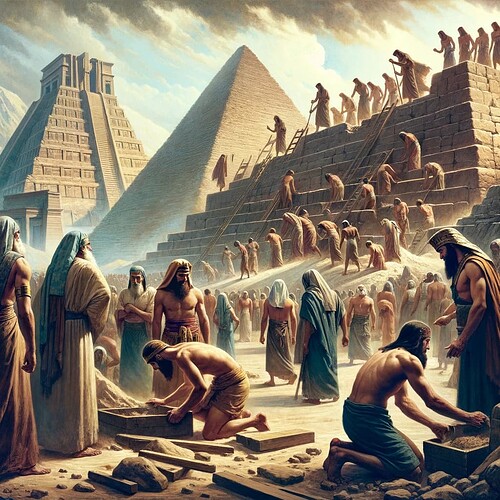 February 1: Exodus 5, 6 - Persistence in the Midst of Trials
February 1: Exodus 5, 6 - Persistence in the Midst of Trials
 Introduction
Introduction
As we step into Exodus 5 and 6, we see Moses and Aaron’s first attempt to free the Israelites from Egyptian bondage, only to be met with increased hardship. Yet, in the midst of this disheartening situation, the Lord reassures, promising deliverance and renewing His covenant.
 Exodus 5: Unfulfilled Expectations
Exodus 5: Unfulfilled Expectations
Here, Moses and Aaron present God’s message only to be met with scorn from Pharaoh. Pharaoh increases the Israelites’ workload, creating more suffering and leaving the Israelites disheartened and Moses questioning God.
![]() “Moses returned to the Lord and said, “Why, Lord, why have you brought trouble on this people? Is this why you sent me?” (Exodus 5:22)
“Moses returned to the Lord and said, “Why, Lord, why have you brought trouble on this people? Is this why you sent me?” (Exodus 5:22)
 Exodus 6: The Assurance of Deliverance
Exodus 6: The Assurance of Deliverance
In a powerful response, God reassures Moses, renewing His promise of deliverance and reminding them of the covenant made with their forefathers.
![]() “Then the Lord said to Moses, “Now you will see what I will do to Pharaoh. He will let them go because of my mighty hand.” (Exodus 6:1)
“Then the Lord said to Moses, “Now you will see what I will do to Pharaoh. He will let them go because of my mighty hand.” (Exodus 6:1)
 Key Themes and Reflections
Key Themes and Reflections
The narrative unveils two major themes - Divine Assurance and Human Doubt. Through God’s repeated promises, we understand the significance of trusting in His unfailing word. This sharply contrasts with the Israelites’ wavering faith and Moses’s questioning. It serves as a reminder that faith is a journey, not a one-time decision and even the chosen ones, like Moses, can falter.
 Today’s Application
Today’s Application
As followers of Christ, we’re bound to face trials that may lead to questions and doubts. But like Moses, let us remember that doubts are opportunities for deeper faith upon reassurance. May we hold on to God’s promises, confident that His word will never return void.
 Hidden Gem
Hidden Gem
Here’s a nugget to ponder over: Notice how God reveals to Moses “I am the LORD” (Exodus 6:2). Known as the Tetragrammaton, this name holds immense significance, representing God’s eternal nature and His active presence.
 Reflective Q&A
Reflective Q&A
![]() Why did Moses question God after facing disappointment?
Why did Moses question God after facing disappointment?
A: Like us, Moses was human and vulnerable to doubt in the face of trials. His reaction is a reminder of our human tendency to waver when our expectations are not met.
![]() What can we learn from God’s response to Moses’s doubts?
What can we learn from God’s response to Moses’s doubts?
A: God’s response to Moses is filled with mercy and patience, truly portraying His loving heart towards His people. It reminds us that God’s promises are trustworthy, even when circumstances suggest otherwise.
![]() How does Exodus 5, 6 apply to our lives today?
How does Exodus 5, 6 apply to our lives today?
A: This narrative encourages us to persist in faith even amidst trials. It teaches us that when facing difficult circumstances, we should lean on God’s promises rather than be swayed by our transient feelings.
 Join the Discussion
Join the Discussion
What challenging situation has shaken your faith recently? How were you reassured of God’s promises? Share your reflections and insights with us.
![]() See You Tomorrow in Exodus 7, 8: The Power of the LORD
See You Tomorrow in Exodus 7, 8: The Power of the LORD
As we journey ahead, we will witness the first encounters of Pharaoh with the mighty hand of God through His plagues. Let’s continue to be open-hearted to His word, persistent in faith, and renew our trust in His promises.
